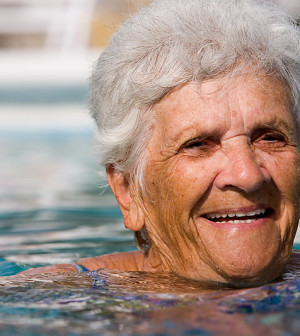- Could Your Grocery Store Meat Be Causing Recurring UTIs?
- Are You Making This Expensive Thermostat Error This Winter?
- Recognizing the Signs of Hypothyroidism
- 10 Strategies to Overcome Insomnia
- Could Artificial Sweeteners Be Aging the Brain Faster?
- Techniques for Soothing Your Nervous System
- Does the Water in Your House Smell Funny? Here’s Why
- Can a Daily Dose of Apple Cider Vinegar Actually Aid Weight Loss?
- 6 Health Beverages That Can Actually Spike Your Blood Sugar
- Treatment Options for Social Anxiety Disorder
Fans May Not Be Cool Choice for the Elderly

When the temperature soars to 108 degrees Fahrenheit or higher, older adults may want to forgo an electric fan, a tiny study suggests.
Research involving nine people over 60 years of age found that using an electric fan raised heart rates and core temperatures when the weather got extremely hot.
“The last thing we want is for people to stop using fans because in more moderate temperatures there’s no question that fans can be beneficial,” said study author Craig Crandall. He’s a professor of internal medicine at the University of Texas Southwestern Medical Center at Dallas.
“We are only saying that in certain conditions, such as an extreme heat wave, fans may be detrimental,” he explained.
But why would sitting in front of a fan cause an older person to get hotter? Fan use increases sweat loss in young adults. When the sweat evaporates, that serves to cool the skin. The elderly, however, appear to have a cap on their capacity to sweat, and this limits the effectiveness of the electric fan, the study authors said.
A total of three men and six women volunteered for the investigation. Their average age was 68. The men wore shorts and the women wore shorts and a sports bra.
Participants sat in a room where the temperature was kept at nearly 108 degrees F for 100 minutes. Crandall said that this level of heat is rare but it does occur, pointing to the Chicago heat wave of 1995 when temperatures peaked at around 108 degrees.
Researchers kept the relative humidity at 30 percent for the first 30 minutes and then hiked it up by 2 percent every five minutes to a maximum humidity of 70 percent.
On randomly assigned days, the volunteers sat in these heated rooms either with a 16-inch fan blowing on them from about three feet away or without the fan.
The study authors noted heart rates of up to nine beats per minute higher when using the fan. In addition, internal body temperatures were three-tenths to four-tenths of a degree higher during the fan sessions.
For example, at 50 percent humidity, the average core temperature was 98.3 degrees F without the fan but 98.7 with the fan. Heart rate was 79 without the fan versus 88 with the fan, the investigators found.
Crandall said that in general these elevations weren’t detrimental, but they might be harmful to individuals who have compromised heart function. For example, a person with heart failure might struggle to get sufficient levels of oxygen if their heart rate increased.
He added that responses measured were only during 100-minute sessions — longer periods of time in such heat might have much different results.
“The concern that we have is that if someone were to sit in front of the fan for eight hours a day, we don’t know how high their core temperature [or heart rate] will become,” said Crandall.
“If that could cause a temperature to be a degree or a degree and a half higher, that could have detrimental effects,” he noted.
Dr. Sarah Samaan, a cardiologist at the Heart Hospital at Baylor in Plano, Texas, agreed that elevated core temperatures could put excessive strain on the heart and aggravate conditions such as high blood pressure and angina [chest pain when the heart muscle is not getting enough blood].
The takeaway from this study for the elderly, according to Crandall, was: “If it’s 100 degrees in the house, don’t rely upon the fan.”
He recommended air-conditioning as an ideal way for the elderly to cool off. If an older person doesn’t personally have air-conditioning, he or she might consider going to a neighbor’s or a family member’s home, a community or senior center, or possibly a movie theater or mall.
“Of course, air conditioning would be the best option,” said Samaan, “but short of that, applying wet compresses would likely be helpful, as would hydration with cool beverages, preferably water.”
Because this study focused only on effects at 108 degrees, Crandall and colleagues plan on conducting further research to determine if there are lower temperatures when the use of an electric fan turns from beneficial to detrimental.
The study was published Sept. 6 in the Journal of the American Medical Association.
More information
The American Heart Association offers information on heat and the heart, along with special precautions to take during hot weather, especially for those older than 50.
Source: HealthDay
Copyright © 2026 HealthDay. All rights reserved.










